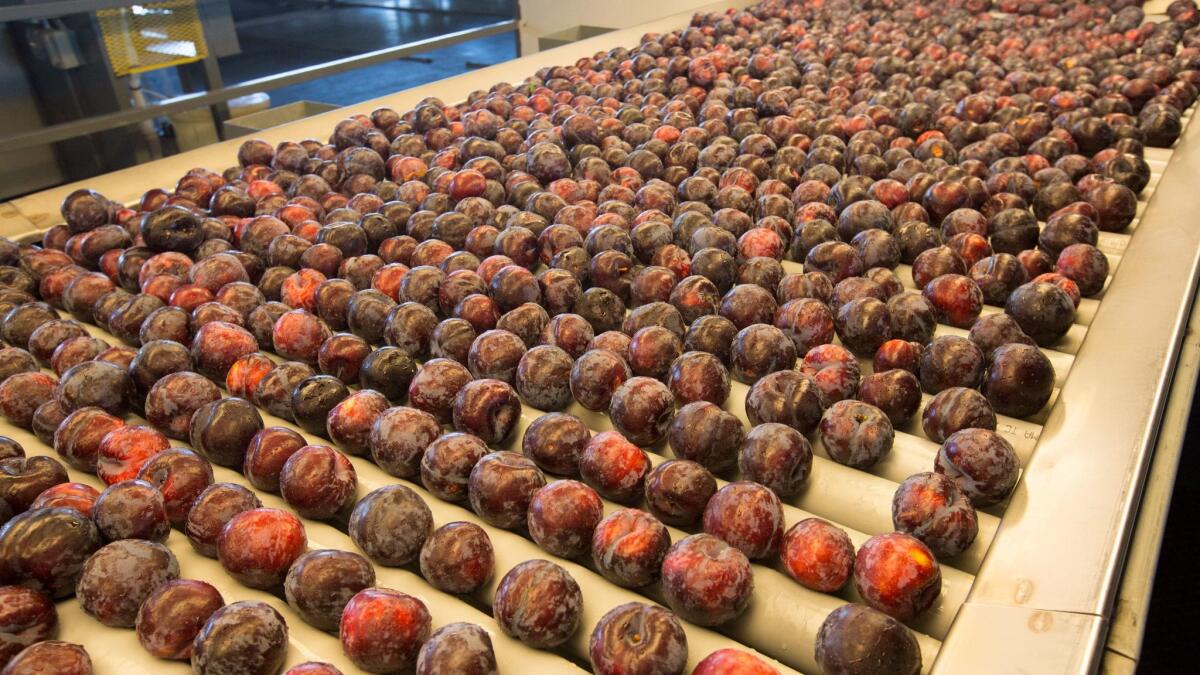California Supreme Court rules for farmworkers, and upholds binding mediation

- Share via
California’s highest court decided unanimously Monday that farmers may have a labor contract imposed on them if negotiations with a union fail to produce an agreement.
The state Supreme Court, overturning a lower court ruling, upheld a 2002 law that permits the state to order farmers and unions to reach binding contracts.
The Legislature passed the law after determining that farmers were refusing to negotiate with unionized workers. The law allows either side to ask for a neutral mediator and for that mediator to impose a contract covering wages and working conditions.
The court said the law provided “numerous safeguards” to ensure fairness, including opportunities for appeal.
Monday’s ruling came in a dispute between the United Farm Workers of America, founded by Cesar Chavez, and Gerawan Farming Inc.
Gerawan owns 12,000 acres in Fresno and Madera counties and employs thousands of workers to grow, harvest and pack stone fruit and table grapes.
After winning the right to represent workers but failing to reach a contract, the UFW asked the state Agricultural Labor Relations Board in 2013 to intervene.
The board ordered a binding mediation, and the mediator eventually wrote a contract that the board approved.
Gerawan sued, arguing the state law was unconstitutional.
United Farm Workers President Arturo S. Rodriguez said Gerawan must now pay workers more than $10 million in back wages.
“After four years of stalling giant Gerawan Farming Inc. should immediately honor the union contract hammered out by a neutral state mediator,” Rodriguez said in a written statement.
The $10-million figure was based on calculations of the difference in hourly pay Gerawan’s 3,000 workers received and the higher wages they would have earned in addition to holiday pay under the state-ordered contract, the union said.
“Gerawan is exactly the kind of case lawmakers had in mind when they enacted the law because the company has been repeatedly found guilty by the state of California of multiple and serious violations of its workers’ rights, including the right to their union contract,” the union said.
Gerawan said it would ask the U.S. Supreme Court to review and overturn Monday’s ruling.
“We believe that coerced contracts are constitutionally at odds with free choice,” the grower said in a written statement.
David A. Schwarz, Gerawan’s lawyer, said the grower does not owe back wages and that enforcement of the contract will be decided in litigation still pending before a state appeals court.
A majority of Gerawan’s workers sought and obtained an election in 2013 to decertify the UFW as their representative but the state agricultural board refused to count the ballots, Schwarz said.
Litigation on whether those ballots must be counted remains pending, he said.
Under the contract approved by the state board, farm workers would have to pay 3% of their wages to the union, Schwarz said.
Gerawan’s workers decided to join the UFW in 1990, and the results of that election were certified in 1992.
Gerawan said 99% of its current workers did not participate in that vote.
Schwarz said the UFW “disappeared” for many years and did nothing to represent the workers, an argument cited by Gerawan in challenging the imposed contract.
The state high court rejected that argument, concluding an employer may not base an objection to binding mediation on challenging a union’s certification as a bargaining representative.
The court cited previous rulings and a “strong legislative policy against employer participation in the union selection process.”
A group that calls itself “Pick Justice” and opposes UFW representation said the decision did not bar workers from decertifying the union.
“The Supreme Court should order the ALRB to count our votes from 2013,” said Silvia Lopez, described as the founder of the informal group.
Twitter: @mauradolan
ALSO
A few lucky turkeys spared the carving knife are the guests of honor at Farm Sanctuary
Red or Green? Your answer speaks volumes about you in New Mexico and its chile capitals
In Amazon HQ frenzy, Fresno offers the most innovative deal of all: nothing
UPDATES:
4:25 p.m.: This article was updated with additional reaction.
1:50 p.m.: This article was updated with additional details from the ruling, and reaction.
This article was originally published at 11:10 a.m.
More to Read
Sign up for Essential California
The most important California stories and recommendations in your inbox every morning.
You may occasionally receive promotional content from the Los Angeles Times.














